- Home
- Annie Proulx
Accordion Crimes Page 8
Accordion Crimes Read online
Page 8
The Beutles were lusty, there was no doubt, and not just because they had nine children living—many in Prank had a dozen and more—but because Beutle didn’t have the decency to control himself until the privacy of the night and the bedcovers. The Railway Express man, Mulkens, drove out with a shipment of young apple stock for him and stumbled on a scene in the woodshed with Gerti bent over the chopping block and Beutle going at it “like a starved hog at the slop bucket.” He whipped his horse into a gallop on the way back to town, eager to tell what he’d seen, right down to red blemishes on Beutle’s buttocks that were maybe not pimples but the mark of some awful disease. Or maybe even bite marks! German beasts. The postman told of an envelope addressed to Beutle that had somehow come unglued and revealed indecent photographs of women, one in a black union suit with cut-out circles from which the breasts protruded.
In autumn, trying to get the corn shocked, the three worked together in each other’s fields, especially when their boys were too young to be useful. Once when they were working at Beutle’s place, Gerti drove up at noon with the dinner pails and jugs of vinegared water. The day was warm. Beutle was working close to the noon spot, waiting for Gerti, Loats thought, probably famished. Loats and Messermacher walked down the field, unstrapping the husking pins from their right hands (for Beutle husked his corn in the field), raising and lowering their heads to get the kinks out of their necks. They saw Beutle and Gerti crawl under the wagon.
“Look, Beutle is gettin into the shade,” said Messermacher enviously.
“Gettin into more than the shade,” Loats said, squinting at the white flash of Beutle’s buttocks. They walked down to the wagon.
“So, you don’t care who’s seeing this?” said Loats, tearing at the cold pork with his yellow teeth. He crouched down and stared under the wagon, hoping to embarrass Beutle.
“Look good, Willy,” said Beutle, breathing deep and rocking deeper, “you learn how to do it and Jesus Christ, I don’t have to come your place Sunday afternoon.”
“Animalisch!” said Loats.
“Leck mich am Arsch!”
“So what, people don’t blink their eye if the dogs do it, or the bull mounts the cow,” Gerti said to Clarissa. “Tell me the difference. We’re the same like them. A natural urge. Sowieso, I can’t stop him. He has to do it three times a day or die.” She was a little past forty, her upper lip already pleating up in fine wrinkles. She craved a little money of her own but Beutle was tight with the purse. She always had a new scheme: butter from the cow—but it was a terrible lot of work and brought only five cents a pound—and when she tried to raise turkeys, first a hailstorm killed seventeen, then the hawks took them. “The difference is we are Christians and animals are not,”
said Clarissa. And she thought, Three times a day! Wahnsinn! The man was a maniac, a living curiosity.
He was a maniac. As Beutle got older his desires deepened and Gerti’s waned. Nothing halted or slowed his sexual drive. He was like the locomotive roaring down the straightaway twenty miles to the east that the train men called “the old board plank.” In 1910 a road company of Irving Berlin’s The Girl and the Wizard came through Prank. Beutle was crazy about it, adopted as his own the naughty song “Oh, How That German Could Love.”
The hen’s nest
The three Germans joined the German-American Historical Society in Kringel, a heavily German town thirty miles north. The society met once a month to promote pride in Kultur through guest speakers, concerts and singing evenings. Beutle enjoyed the long drive. The size of the country still made him giddy, and even after a drenching rain, the horse steaming as it trotted, he tossed off his slicker, pulled the fresh air into his nose and looked at the washed sky, the rolling cloud drawing away, while he perfected the phrases in the speech he was to give: “Germans gave much to America. The American Revolution would have failed if Germans didn’t help out. The Republican Party come about from the interest of German Americans. And never forget that Abraham Lincoln was descended from a German immigrant named Linkhorn. America needs Germans to fulfill its destiny.”
But down in Prank the Railway Express man said, better drown them all—they can’t never fit this country, the Dutchies, those squareheads, those sourkrauts.
Beutle took a German paper that came weekly by mail and, when he was done reading it and clipping out the interesting advertisements, passed it on to Loats and Messermacher. It was from this paper he had learned of Linkhorn and from it ordered a perforated cardboard portrait of the dead president for Gerti to work up in colored wools. She dyed the wool strands for the face with ironweed, giving Lincoln a yellow complexion that changed slowly to a greenish brown over the winter. She was sewing the hem of a pinafore. A sewing machine—if she only had one.
“It’s the Germans making this country great,” agreed Loats. “Here’s the dirty Irish in Prank, there’s not one can read a signpost or sign his name.”
Messermacher was the richest of the three, although he had trouble with his eyes, sensitive to the windblown dust he lived in, and he dosed them with Dr. Jackson’s Eye Water. Two of his sons worked with him on his farm, the other three farmed adjacent or nearby sections, and one son, Karl, lived in town and worked for the railroad as a telegraph operator. Messermacher bought one of the new wireless check-row corn planters but it fouled and skipped when it passed over dead furrows. He modified it, wrote a letter to the manufacturer, and when the representative came out, gave him such an impressive demonstration that the company paid him one hundred dollars and an annual royalty for the invention for years. Until the war they used his photograph in their advertisements: Farmer L. Messermacher says “This planter won’t go wrong. Simple enough so a boy can run it.”
Loats’s hogs were famous in Chicago; a few were fattened for the table of the governor and for the Century Club in Chicago. He had skill with wheat and hogs but thought the best thing on his farm was a twenty-acre orchard of sour cherry trees, each tree a phosphorescent globe of white netting as the fruit ripened.
Yet there was something strange. Although they were all successful farmers, the farms showplaces of thrift and good management, although they played music for every dance, the Germans were disliked in Prank. The children (called cabbageheads in school) and women were friendless except for each other’s company. Part of it was because Clarissa was a fanatic housekeeper who scrubbed the exteriors of house and barn and whose snow-white floors dazzled, and few women wanted such a perfectionist for a friend; part because the three Germans were freethinkers, self-confessed agnostics who bragged that there was not a bible among them. And part of it was because in spite of locust, drought, hail, flood, tornado, summer frost and untimely thaw, the three always made a decent crop while men around them lost everything. In the flood the Little Runt rose over Beutle’s low field, but when the water receded, dozens of fine fish were stranded in the wet, enriched furrows. He had only to gather them. The gossip flourished, juicy tales of German lubricity and incest. Most of the whispers routed back to Beutle and his insatiable appetites.
“Nah. The reason we don’t play them dances so much now,” said Beutle, “is the people hereabouts wants coon songs. Ragtime. The saxophone. They wants the piana accordion; the button accordion ain’t good enough for them anymore. You see?”
By the time there were grandchildren around—the oldest son, Percy Claude, and his wife had built near the main house and the other boys had houses on the section—Gerti didn’t want to be caught accommodating Beutle. At their age, she told him. Grey hair and all. Her big belly and his hairy hams like a bear. She pushed him away more frequently. Behavior that had been exciting when he was young was repellent in a slack-skinned man with grey hair. The situation got more complicated when she walked into the henhouse and there he was with the hired girl, he sitting in a hen’s nest and the girl straddling him, her knickers on a nail. He winked at his wife as if to say, you won’t and she will. There were straws in his hair.
She dodged away as thou
gh she had been sluiced with a bucket of icy water, a freezing despair running over her. She ran for her kitchen, moaning, heavy breasts swinging, the great haunches pumping her along. In the kitchen she leaned against the cold stove, put her forehead to the chrome edge of the warming oven and sobbed with grief and insult until her nose swelled. She stumbled to the knife drawer in the dresser and took out the black-handled carving knife, IXL stamped on the blade, and without reflection drew it across her throat. The heat of her own blood soaking her shirtwaist brought her to her senses. To kill herself over a man in a hen’s nest! Never!
She got to the wavery-glassed mirror over the sink and looked. The blood was seeping, not jetting, though the cut gaped half an inch wide; the good layer of fat had saved her. Stanching the wound with a snowy dish towel, she got needle and thread from her sewing box and went back to the mirror and sewed up the lips of the wound with a steady hand. The thread was blue. She wrapped a clean rag around her neck. She had a mind to sew something else up as well.
Now Beutle was a dirty old thing to her. She killed every hen that had witnessed her humiliation, screamed at the hired girl until she ran home bawling, and he couldn’t say a thing. She dumped floor sweepings into his tobacco box, stirring to mix in the clots of dirt. She thought often of putting a little rat poison in his coffee, yet did not.
But he’d get in the buggy after lunch and go somewhere.
“Goin over to see Loats,” he’d say, and she guessed he was after Loats’s daughter Polly who was still at home, a dried-up old maid at twenty-six who had almost died of consumption and then gained on the illness, and maybe not as dried-up as all that; she must have some juice.
She said something to Clarissa who kept her eyes open and sure enough, one day she saw Beutle following Polly into the apple trees. Clarissa ran to Loats and asked him to get the shotgun and use it.
“For what? He’s just walking along behind her, you say.”
“You know Beutle. You know what he’s up to.”
“You say he was following her. If she was in the lead, it don’t sound like he’s forcing nothing at all.”
“She don’t know what she’s doing. She’s innocent, I tell you.”
“Going on thirty, maybe not so innocent as you suppose.”
“You ought to beat the stuffings out of him, but I see you don’t do a thing.”
No, Loats wouldn’t do a thing. If Beutle was having fun with Polly, he was doing something no one else had done. Loats believed the three Germans were bound by fate, and fate was the strongest force in life. And though once he’d trusted that common fate had removed them from the pinched seasons of the old country and directed all three of them toward rich and fruitful lives, fate began to turn its hand against them when the Serbs shot the Archduke Ferdinand in Sarajevo. It was as though ancient European enmities had sought them out from over the sea, slinking along behind each of them, just out of sight, had burrowed under the grass, waiting, as a pestilence waits until the right moment, then had risen up, eager and poisonous.
The war
Hatred came on slowly, like chill air rolling down a slope at sunset.
“‘Hyphenism’—what is this ‘hyphenism’ business?” said Loats, smoothing out Beutle’s paper. They sat at the oak table in Loats’s overheated kitchen, the wife pressing shirts near the stove where the heavy irons heated, Beutle firing up his black pipe with lunty puffs. On the scrubbed table stood a vinegar cruet, a celluloid baby rattle and a stoneware jar of gleaming forks and knives.
“This is Roosevelt’s horse, he is riding it hard. He don’t like hyphens! Jesus Christ! He is concerned about German hyphen Americans. See here, down here. He says, ‘some Americans need hyphens in their names because only part of them have come over. But when the whole man has come over, heart and thought and all, the hyphen drops of its own weight out of his name.’ And what else drops? Jesus, Jesus and Christ, a beautiful language, Bach, Handel, Mozart, Schiller drops, Goethe drops, Kant and Hegel, Wagner, Wagner drops. Schubert, he drops. The accordion drops. And beer drops. Instead we get crazy dried-up American women yelling for the vote and the goddamn dried-up Americans and their dried-up American ideas about Prohibition. They don’t see the Germans are the best, the hardest-working people in America. They don’t see that everything that is good in America come from the Germans.”
“Not the electric irons,” said Loats’s wife—the new wife, Pernilla—Clarissa had finally died of tremors and weakness. “I heard in town Mrs. O’Grain got a iron runs from the electric cord. She don’t have to heat it on the stove, roast to death. That’s what I want with my egg money, one of them irons.”
“Jesus Christ,” said Beutle, “you got to have electricity first. Where you going to plug it, up your hole? The iron ain’t no good by itself.” (Six months later, when he discovered the appliance was made by Rowenta, a German firm, he told Loats he ought to buy one.)
In the autumn of 1916, Beutle, furious at the crooked reporting of the American newspapers, subscribed to a second paper, Fatherland, which he read with vitriolic relish. He donated three dollars to a German war relief fund and as a token received a ring decorated with a replica of the Iron Cross and the inscription To show my loyalty to the old Fatherland, I brought it gold in time of trouble for this piece of iron.
“Well,” said Loats, “don’t pass this damn paper along to me anymore, Hans. I don’t like it no more. Anyway I got one of them crystal sets. They are broadcasting the war news.” (Although he sat with the earphones on his head, adjusting the cat’s whisker by the hour, he heard nothing.)
“Oho!” said Beutle. “Listen, my friend, the crystal set will be as bad as the American newspapers and everything you read in an American newspaper favors the English and condemns the Germans. That’s Wilson’s famous neutrality! Fatherland only corrects this unfair reporting of the news. The lies and unjust accounts of the Lusitania? You can’t deny their lies. Fatherland tells you right here about this crazy American newspaper that named what happened to the Lusitania as ‘the worst crime since the crucifixion of Christ.’ Jesus Christ, they don’t admit the ship was loaded with munitions. You have to read this paper to discover the truth! And look here, American news too—in New Jersey a man is poisoned by his wife through pancakes.”
“I guess I give up the hyphen, Hans. I don’t care if they drop a thousand bombs on the Kaiser’s head. I don’t feel so German now. My children, they’re born here, this is their country. I should keep hanging on to the old place that never did anything but drive me away? I just want America to stay out of it, this war, I want to work my farm and sit down to a good dinner and sleep good at night.” And it was true that Loats’s daughter Daisy had borrowed a copy of Walt Whitman’s I Hear America Singing from the teacher and read it aloud after supper.
Beutle hawked and spit at this perfidy, ordered four new gramophone records from Columbia’s Patriotic German Music selection: “Hipp, Hipp, Hurrah,” “Die Wacht am Rhein,” “Wir Müssen Siegen” and “Deutschland, Deutschland über Alles,” sung by a rich-toned male quartet. But this was not enough. He joined the German-American Alliance and his buggy showed up at every rally. He wrote, in his rusty German, a repetitive four-page pamphlet titled “The German Hog in America,” listing the names of outstanding noble German white hogs, many of them his own. Two evenings a week, after supper, he took his accordion down to the saloons in Prank and tried to explain reasonably to the men he knew that as a person of German extraction he was loyal both to his motherland, Germany, and to his bride, America. He tried to persuade them with German music.
“And this is terrible beer. Jesus Christ! You come out my farm and try my beer, German beer, one time.”
The bartender rolled his cold American eyes away from Beutle, turned his shoulder. He spoke to a customer at the end of the bar.
“They come right up to you and tell you they’re better.”
“Hang the Irish and shoot the hyphenates,” said the customer, sniggering. The next day a
sign without a single flyspeck hung over the bar: GERMANS NOT WELCOME. GET THE HELL BACK TO DUTCHLAND. The bartender pointed to it. Beutle read it, made a face as if while swallowing a cup of vinegar he’d witnessed a flying cow, farted and walked out. He went to the new movie palace down the street to see long-faced William S. Hart and Louise Glaum in a shoot-’em-up, The Aryan. The intertitle flashed on the screen while the Irish piano player rattled out a march. “Oft written in letters of blood, deep carved in the face of destiny, that all men may read, runs the code of the Aryan race: our women shall be guarded.” He thought of guarding Gerti from harm and snorted.
Misfortunes
Anti-German fever flared. In April 1918 they heard that in Illinois some miners, like fifty cats with a single mouse, played with German immigrant Robert Prager for two days, a young man, naive and confused, who knew little English. They stripped him raw, prodded him up and down the muddy streets forcing him to kiss the American flag again and again, to sing “The Star-Spangled Banner,” which he could not do, to sing “We’ll Fight for the Red, White and Blue,” which he managed, stumbling over the words, letting him go, losing him, capturing him again from the grinning police, grilling and questioning, more flag-kissing and singing, calling for tar and feathers but finding rope and, drunk and inept and deadly, hauling the wretched man up into the air by his neck until at last he strangled. A rain of black moths fluttered from the tree, agitated by the dying man’s commotion.
In May, Karl, Messermacher’s son who was the telegraph operator, fell panting into the kitchen at broad noon, his clothes torn and his face bloody, his celluloid collar hanging in a jagged arc, left arm hanging useless, wrenched so badly he was never able to raise it above his shoulder again.

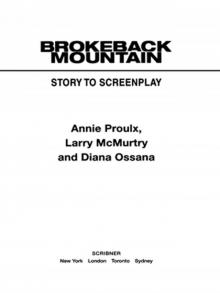 Brokeback Mountain
Brokeback Mountain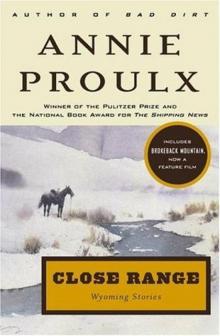 Close Range
Close Range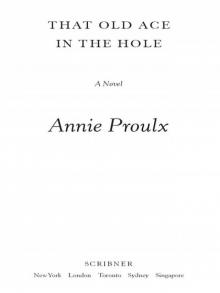 That Old Ace in the Hole
That Old Ace in the Hole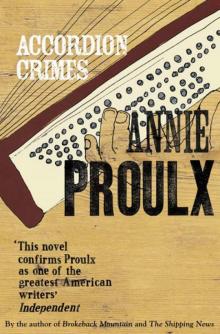 Accordion Crimes
Accordion Crimes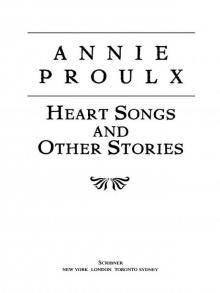 Heart Songs and Other Stories
Heart Songs and Other Stories The Shipping News
The Shipping News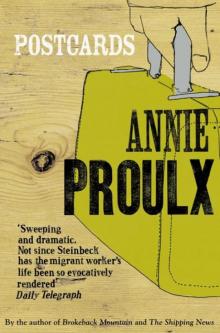 Postcards
Postcards Bird Cloud
Bird Cloud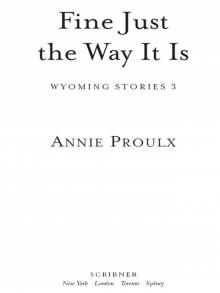 Fine Just the Way It Is
Fine Just the Way It Is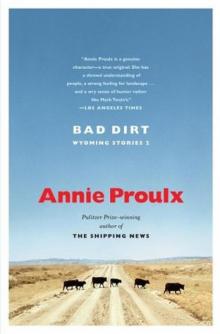 Bad Dirt
Bad Dirt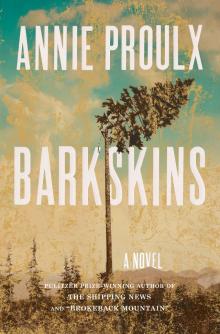 Barkskins
Barkskins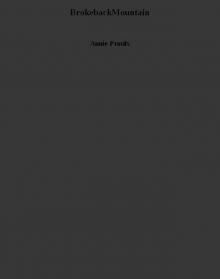 BrokebackMountain
BrokebackMountain Bird Cloud: A Memoir of Place
Bird Cloud: A Memoir of Place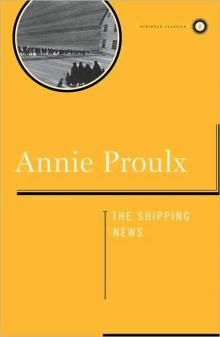 Shipping News_A Novel
Shipping News_A Novel